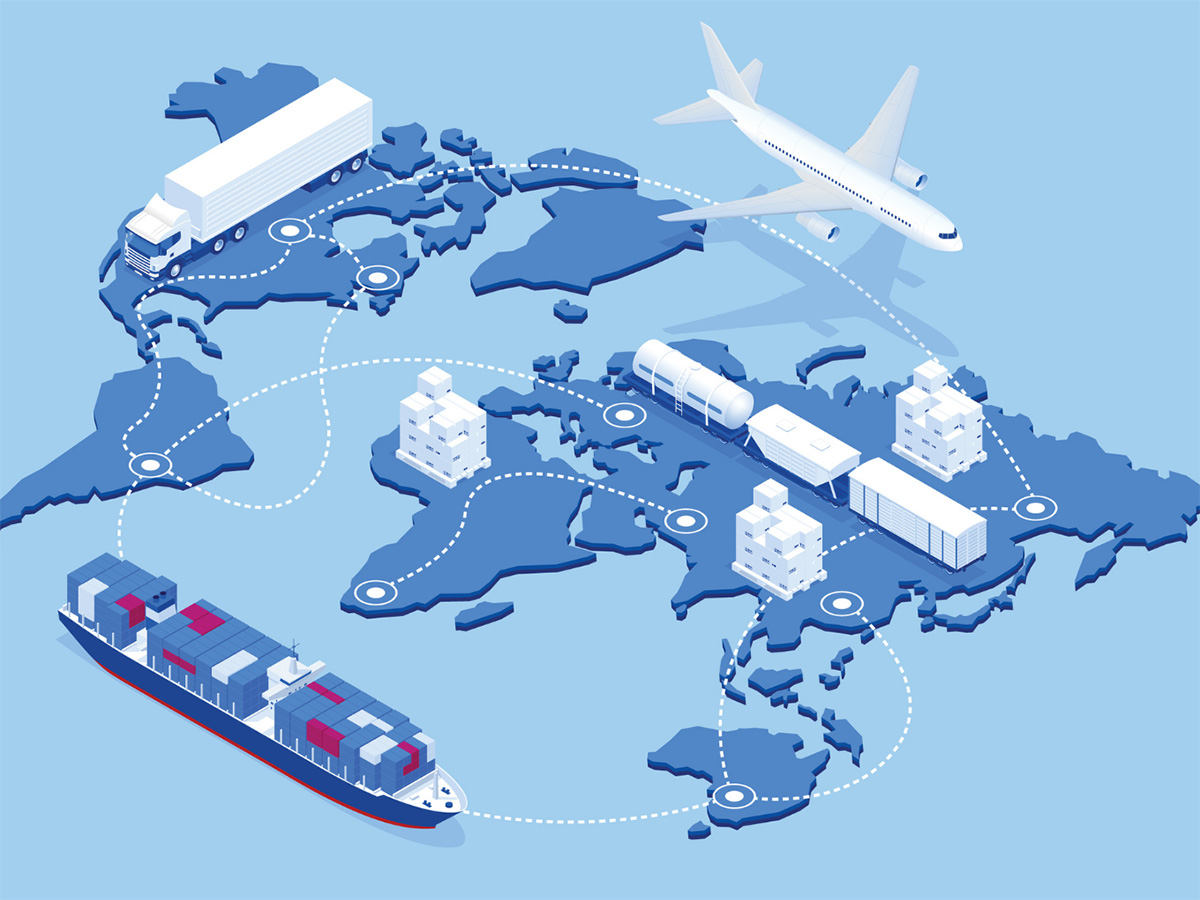

Finance
What Does A Supply Chain Engineer Do
Modified: February 21, 2024
Discover what a supply chain engineer does in the field of finance. Learn about their role in optimizing operations, reducing costs, and improving efficiency.
(Many of the links in this article redirect to a specific reviewed product. Your purchase of these products through affiliate links helps to generate commission for LiveWell, at no extra cost. Learn more)
Table of Contents
- Introduction
- Overview of Supply Chain Engineering
- Role and Responsibilities of a Supply Chain Engineer
- Analyzing and Evaluating Supply Chain Processes
- Designing and Optimizing Supply Chain Networks
- Implementing and Monitoring Supply Chain Solutions
- Collaboration and Communication in Supply Chain Engineering
- Technical Skills and Tools for Supply Chain Engineers
- Qualifications and Education for Supply Chain Engineering
- Career Path and Growth Opportunities in Supply Chain Engineering
- Conclusion
Introduction
Welcome to the world of supply chain engineering! In today’s fast-paced business environment, companies are constantly striving to improve their efficiency and effectiveness in delivering products and services to customers. This is where supply chain engineers come into play. Supply chain engineering is a critical function that focuses on designing, developing, and optimizing the processes and networks that enable the flow of goods and information from suppliers to end-customers.
Supply chain engineering is a multidisciplinary field that draws upon principles from engineering, operations research, logistics, and data analytics to create innovative and efficient supply chain solutions. It is not just about moving products from point A to point B; it involves analyzing data, identifying bottlenecks, optimizing transportation routes, improving inventory management, and reducing costs while ensuring timely delivery and customer satisfaction.
Effective supply chain engineering requires a deep understanding of business processes, technologies, and industry trends. It involves working with cross-functional teams, including procurement, manufacturing, transportation, and customer service, to develop integrated and streamlined supply chain solutions. Supply chain engineers must also stay abreast of emerging technologies, such as blockchain, artificial intelligence, and robotics, that can revolutionize supply chain operations and create a competitive advantage.
In this article, we will explore the role and responsibilities of supply chain engineers, the key skills and tools they use, the required qualifications and education, and the career path and growth opportunities in this field. So, whether you are a student considering a career in supply chain engineering or a professional looking to enhance your knowledge, read on to discover the exciting world of supply chain engineering.
Overview of Supply Chain Engineering
Supply chain engineering is a field that focuses on the design, optimization, and management of the interconnected network of activities involved in the flow of products, services, and information from suppliers to end-customers. The goal of supply chain engineering is to create efficient and cost-effective supply chain processes that meet customer demands while minimizing lead times and costs.
At its core, supply chain engineering seeks to address key challenges that companies face in their supply chain operations. These challenges include the need for accurate demand forecasting, effective inventory management, efficient transportation and logistics, streamlined order processing, and responsive customer service.
Supply chain engineering entails a wide range of activities, including:
- Mapping and modeling the end-to-end supply chain processes to identify inefficiencies, bottlenecks, and areas for improvement.
- Conducting data analysis and using mathematical optimization techniques to optimize supply chain networks, including the design of distribution centers, warehouse layouts, and transportation routes.
- Implementing advanced technologies such as Internet of Things (IoT), artificial intelligence (AI), and machine learning (ML) to enhance supply chain visibility, automate processes, and improve decision-making.
- Collaborating with suppliers, manufacturers, and logistics providers to establish effective communication channels and build strong partnerships.
- Managing risks and uncertainties in the supply chain, such as geopolitical factors, natural disasters, and disruptions in the global market.
Supply chain engineers play a crucial role in optimizing supply chain operations by identifying opportunities for cost reduction, lead time reduction, and efficiency improvement. They work closely with cross-functional teams to implement and monitor supply chain solutions. By leveraging their knowledge of industry best practices, emerging technologies, and data-driven insights, supply chain engineers help companies adapt to changing market dynamics and stay competitive in a globalized economy.
In the next sections, we will explore the specific roles and responsibilities of supply chain engineers, as well as the technical skills and tools they utilize in their day-to-day work.
Role and Responsibilities of a Supply Chain Engineer
A supply chain engineer plays a vital role in ensuring the smooth and efficient functioning of a company’s supply chain. They are responsible for designing, implementing, and improving supply chain processes and networks to optimize operations and maximize customer satisfaction. Here are some key responsibilities of a supply chain engineer:
- Process Analysis and Improvement: Supply chain engineers are responsible for analyzing the existing supply chain processes to identify inefficiencies and areas for improvement. They use tools like process mapping and data analysis to identify bottlenecks, reduce lead times, and enhance overall operational efficiency.
- Optimization and Simulation: Supply chain engineers use mathematical modeling and optimization techniques to design and optimize supply chain networks. This includes determining the optimal location for distribution centers, optimizing inventory levels, and optimizing transportation routes to minimize costs and improve efficiency. They also use simulation techniques to evaluate the impact of different scenarios and make informed decisions.
- Inventory Management: Supply chain engineers are responsible for developing strategies to effectively manage inventory levels throughout the supply chain. This includes determining optimal reorder points, safety stock levels, and inventory replenishment policies to ensure adequate stock availability while minimizing carrying costs and stockouts.
- Supplier and Vendor Management: Supply chain engineers play a key role in developing and maintaining strong relationships with suppliers and vendors. They evaluate supplier performance, negotiate contracts, and ensure timely delivery of goods and services. They also work on identifying alternate sources of supply and developing contingency plans to mitigate supply chain risks.
- Data Analysis and Reporting: Supply chain engineers analyze supply chain data to identify trends, patterns, and areas for improvement. They generate reports and dashboards to provide insights into key performance metrics such as on-time delivery, fill rate, and inventory turnover. They use this data to drive continuous improvement initiatives and make data-driven decisions.
- Cross-functional Collaboration: Supply chain engineers collaborate with various teams within the organization, such as procurement, manufacturing, logistics, and customer service, to ensure alignment and coordination across all supply chain activities. They work closely with cross-functional teams to implement new processes, resolve operational issues, and drive process improvements.
In summary, a supply chain engineer plays a critical role in optimizing supply chain processes and networks to ensure efficient and cost-effective operations. They utilize analytical skills, problem-solving abilities, and a deep understanding of supply chain principles to drive continuous improvement and deliver value to the organization.
Analyzing and Evaluating Supply Chain Processes
An essential part of a supply chain engineer’s role is to analyze and evaluate the various processes within the supply chain to identify inefficiencies and opportunities for improvement. By conducting a thorough analysis, supply chain engineers can optimize processes, reduce costs, and enhance overall supply chain performance. Here are some key aspects of analyzing and evaluating supply chain processes:
- Process Mapping: Supply chain engineers start by mapping out the end-to-end processes within the supply chain. This involves understanding the flow of materials, information, and resources from suppliers to customers. Process mapping helps in visualizing the entire supply chain and identifying any bottlenecks or redundancies.
- Data Collection and Analysis: Supply chain engineers collect and analyze data related to various supply chain activities, including order processing, inventory management, transportation, and warehousing. They use statistical analysis and data visualization techniques to identify patterns, trends, and areas of improvement. Data analysis provides insights into the performance of different processes and helps in identifying areas for optimization.
- Key Performance Indicators (KPIs): Supply chain engineers establish and track key performance indicators to measure the effectiveness and efficiency of supply chain processes. Common KPIs include on-time delivery, order cycle time, inventory turnover, and customer satisfaction. By monitoring these KPIs, supply chain engineers can identify areas that require improvement and set targets for process optimization.
- Root Cause Analysis: When inefficiencies or issues are identified in supply chain processes, supply chain engineers conduct root cause analysis to identify the underlying causes. This involves identifying and analyzing the factors contributing to the problem and then developing and implementing effective solutions to address them.
- Continuous Improvement: Supply chain engineers implement continuous improvement initiatives based on the analysis of supply chain processes. This involves regularly reviewing and reassessing processes to identify areas where they can be further enhanced. Continuous improvement ensures that the supply chain operations remain efficient and adaptable to changing market conditions and customer demands.
- Technology Evaluation: Supply chain engineers evaluate and recommend the adoption of new technologies and tools to optimize supply chain processes. This includes technologies like advanced planning systems, warehouse management systems, and transportation management systems. By leveraging technology, supply chain engineers can streamline processes, enhance visibility, and improve decision-making.
Analyzing and evaluating supply chain processes is a critical step in driving continuous improvement and achieving operational excellence. By identifying areas for enhancement, supply chain engineers can optimize processes, reduce costs, and enhance customer satisfaction, ultimately enabling the organization to gain a competitive advantage in the market.
Designing and Optimizing Supply Chain Networks
One of the key responsibilities of a supply chain engineer is to design and optimize supply chain networks. A supply chain network consists of various nodes, such as suppliers, manufacturing facilities, distribution centers, and retail locations, and the connections between them. The design and optimization of these networks play a crucial role in improving efficiency, reducing costs, and enhancing customer satisfaction. Here are the main aspects of designing and optimizing supply chain networks:
- Network Modeling: Supply chain engineers use mathematical models and simulation techniques to model the supply chain network. This involves determining the optimal location and number of facilities, such as distribution centers and manufacturing plants, to ensure efficient and cost-effective operations. They consider factors such as customer demand, transportation costs, and inventory holding costs to design an optimal network configuration.
- Transportation Optimization: Supply chain engineers optimize transportation routes and modes to minimize costs and enhance efficiency. This includes determining the most efficient routes, selecting the appropriate transportation modes (e.g., road, rail, air, or sea), and optimizing carrier selection. They also consider factors like transit times, transportation lead times, and customer service requirements.
- Inventory Optimization: Supply chain engineers work on optimizing inventory levels throughout the supply chain network. They consider factors like demand variability, lead times, and service levels to determine optimal inventory levels at each node within the network. By optimizing inventory, supply chain engineers can minimize holding costs while ensuring adequate stock availability to meet customer demands.
- Collaboration and Integration: Supply chain engineers focus on fostering collaboration and integration among various nodes within the supply chain network. They establish effective communication channels and information-sharing mechanisms to facilitate seamless coordination between suppliers, manufacturers, and distributors. By improving collaboration, supply chain engineers can reduce lead times, eliminate redundancies, and enhance overall supply chain performance.
- Technology Integration: Supply chain engineers leverage technology to optimize supply chain networks. This involves the integration of advanced planning systems, warehouse management systems, and transportation management systems to streamline operations, enhance visibility, and improve decision-making. By leveraging technology, supply chain engineers can achieve greater efficiency and responsiveness in their supply chain networks.
- Sustainability and Resilience: Supply chain engineers consider sustainability and resilience factors when designing and optimizing supply chain networks. They assess the environmental impact of the network design and identify opportunities for reducing carbon emissions and waste. They also consider risks and uncertainties, such as natural disasters and disruptions, and develop contingency plans to ensure the resilience of the supply chain network.
Designing and optimizing supply chain networks is crucial for companies to achieve cost savings, improve customer service, and gain a competitive advantage. By utilizing mathematical models, advanced technologies, and collaboration strategies, supply chain engineers can create efficient and responsive supply chain networks that can adapt to changing market conditions and deliver value to the organization.
Implementing and Monitoring Supply Chain Solutions
Implementing and monitoring supply chain solutions is a vital part of a supply chain engineer’s role. Once the design and optimization of the supply chain network are complete, supply chain engineers focus on implementing these solutions and ensuring their successful execution. Here are key aspects of implementing and monitoring supply chain solutions:
- Solution Implementation: Supply chain engineers work closely with cross-functional teams to implement the proposed supply chain solutions. This involves coordinating with suppliers, manufacturers, and logistics providers to ensure a smooth transition. They collaborate with internal stakeholders to align processes, systems, and resources with the new supply chain design, ensuring effective implementation.
- Process Standardization: Supply chain engineers develop standardized processes and procedures to ensure consistency and efficiency throughout the supply chain. They document workflows, define key performance indicators (KPIs), and establish operating guidelines to guide the execution of supply chain activities. Standardization helps in achieving operational excellence, reducing errors, and streamlining operations.
- Performance Monitoring: Supply chain engineers continuously monitor the performance of the implemented supply chain solutions. They track key metrics, such as on-time delivery, order accuracy, inventory turnover, and customer satisfaction, to assess the effectiveness and efficiency of the supply chain operations. They use data analysis and reporting tools to identify areas for improvement and make data-driven decisions.
- Continuous Improvement: Supply chain engineers drive continuous improvement initiatives to enhance the performance of the implemented supply chain solutions. They analyze performance data, conduct root cause analysis, and identify opportunities for optimization. Through collaboration with cross-functional teams, they develop and implement process improvements, efficiency enhancements, and cost-saving initiatives.
- Risk Management: Supply chain engineers are responsible for identifying and mitigating risks in the supply chain. They conduct risk assessments to identify vulnerabilities and develop contingency plans to address potential disruptions. They stay updated on market trends and external factors that could impact the supply chain, such as changes in regulations, geopolitical events, or natural disasters.
- Communication and Collaboration: Supply chain engineers ensure effective communication and collaboration within the supply chain network. They establish regular meetings, share performance reports, and maintain open lines of communication with key stakeholders. By fostering collaboration, supply chain engineers can quickly address any issues, resolve conflicts, and drive alignment towards common goals.
Implementing and monitoring supply chain solutions is an ongoing process that requires a proactive and analytical approach. Through effective implementation, performance monitoring, and continuous improvement, supply chain engineers can ensure that the supply chain solutions deliver the desired results and contribute to the organization’s overall success.
Collaboration and Communication in Supply Chain Engineering
Collaboration and communication are essential elements of successful supply chain engineering. Supply chain engineers work with various stakeholders, both internal and external, to ensure seamless coordination and effective execution of supply chain activities. Clear and open lines of communication, as well as collaborative partnerships, drive efficiency, agility, and innovation within the supply chain. Here are key aspects of collaboration and communication in supply chain engineering:
- Internal Collaboration: Supply chain engineers collaborate with different departments within the organization, such as procurement, manufacturing, sales, and customer service. They work together to align goals, share information, and coordinate activities to ensure that supply chain operations are fully integrated and aligned with broader business objectives. Internal collaboration facilitates effective decision-making and supports efficient execution of supply chain strategies.
- Supplier Collaboration: Supply chain engineers establish collaborative partnerships with suppliers and vendors. This involves regular communication to share information related to demand forecasts, production plans, and inventory levels. Collaborative relationships with suppliers help in achieving a synchronized and efficient supply chain flow. Supply chain engineers work together with suppliers to address issues, manage risks, and identify opportunities for process improvement.
- Customer Collaboration: Supply chain engineers engage in collaborative partnerships with customers to better understand their needs, preferences, and expectations. By actively involving customers in the supply chain planning and execution processes, supply chain engineers can enhance customer satisfaction and responsiveness. Effective communication with customers helps in gaining insights, resolving issues, and identifying areas for improvement.
- Information Sharing: Supply chain engineers ensure that relevant information flows efficiently within the network. This includes sharing demand forecasts, production schedules, inventory levels, and logistics information with stakeholders. They leverage advanced technologies and collaborative platforms to facilitate real-time information sharing and enhance visibility across the supply chain. Information sharing improves decision-making, enables timely response to changes, and supports agile supply chain operations.
- Conflict Resolution: Supply chain engineers are skilled in conflict resolution. They possess the ability to navigate and resolve conflicts that may arise between different departments, suppliers, or customers. By promoting open dialogue and finding win-win solutions, supply chain engineers foster harmonious relationships and maintain the overall efficiency and effectiveness of the supply chain.
- Continuous Improvement: Collaboration and communication are central to driving continuous improvement initiatives in supply chain engineering. Supply chain engineers actively seek feedback and suggestions from stakeholders to identify areas for improvement. They also actively participate in cross-functional teams and industry networks to stay updated on emerging trends, technologies, and best practices. By fostering a culture of collaboration and continuous improvement, supply chain engineers drive innovation and optimize supply chain performance.
Effective collaboration and communication are critical components of supply chain engineering. By establishing strong partnerships, sharing information, and addressing conflicts promptly, supply chain engineers can enhance efficiency, responsiveness, and customer satisfaction, ultimately driving the success of the supply chain.
Technical Skills and Tools for Supply Chain Engineers
In the field of supply chain engineering, proficiency in technical skills and the effective utilization of tools are essential for success. Supply chain engineers leverage various technologies, software applications, and analytical techniques to optimize supply chain operations. Here are some key technical skills and tools that supply chain engineers utilize:
- Data Analysis: Supply chain engineers possess strong analytical skills and the ability to work with large datasets. They use statistical analysis techniques and data visualization tools to analyze supply chain data and gain insights into performance trends, identify areas for improvement, and make data-driven decisions.
- Supply Chain Software: Supply chain engineers are proficient in using specialized software applications designed for supply chain management. They utilize tools such as Enterprise Resource Planning (ERP) systems, Warehouse Management Systems (WMS), Transportation Management Systems (TMS), and Advanced Planning and Scheduling (APS) software to streamline operations, optimize inventory levels, and improve overall supply chain efficiency.
- Simulation and Optimization Software: Supply chain engineers employ simulation and optimization software to model and analyze supply chain networks. These tools help in evaluating different scenarios, optimizing transportation routes, and making informed decisions to enhance supply chain performance. Popular software packages include AnyLogic, Llamasoft Supply Chain Guru, and AIMMS.
- Data Management and Integration: Supply chain engineers work with databases and data integration tools to manage and integrate supply chain data from various sources. They ensure data accuracy, cleanliness, and integrity, and develop data structures that support effective analysis and reporting. Tools such as SQL (Structured Query Language) and ETL (Extract, Transform, Load) tools are commonly used in data management and integration.
- Supply Chain Analytics: Supply chain engineers utilize supply chain analytics tools to extract insights, identify patterns, and optimize key supply chain processes. These tools enable forecasting, demand planning, inventory optimization, and performance analytics. Popular analytics tools include Tableau, Power BI, and SAS.
- Project Management: Supply chain engineers possess project management skills to effectively plan, execute, and monitor supply chain improvement initiatives. They use project management tools, such as Gantt charts and project management software (e.g., Microsoft Project), to track progress, manage resources, and ensure timely completion of projects.
- Process Mapping and Visualization: Supply chain engineers utilize process mapping tools and visualization software to map out and visualize supply chain processes. These tools help in identifying bottlenecks, optimizing process flows, and facilitating effective communication with stakeholders. Examples of process mapping tools include Microsoft Visio, Lucidchart, and BPMN (Business Process Model and Notation).
Mastering these technical skills and effectively utilizing these tools enables supply chain engineers to perform data-driven analysis, optimize processes, and make informed decisions to enhance supply chain efficiency and effectiveness. Continuous learning and staying updated on emerging technologies and trends in the field contribute to the continued growth and success of supply chain engineers.
Qualifications and Education for Supply Chain Engineering
To embark on a successful career in supply chain engineering, individuals typically pursue a combination of qualifications and education that provide them with the necessary skills and knowledge. Here are the key qualifications and educational paths commonly pursued by aspiring supply chain engineers:
- Bachelor’s Degree: Many supply chain engineers possess a bachelor’s degree in supply chain management, industrial engineering, operations research, or a related field. These programs typically cover subjects such as logistics, procurement, inventory management, process optimization, and data analysis. A bachelor’s degree provides a solid foundation for understanding the principles and dynamics of supply chain engineering.
- Master’s Degree: Some supply chain engineers pursue a master’s degree in supply chain management, engineering management, or a related field to further enhance their skills and knowledge. A master’s degree offers a deeper understanding of advanced concepts in supply chain engineering, such as strategic sourcing, supply chain analytics, sustainability, and risk management. It can also provide opportunities for specialization in specific areas of supply chain engineering.
- Certifications: Supply chain engineers can further enhance their credentials by obtaining relevant certifications. Notable certifications include Certified Supply Chain Professional (CSCP) by APICS, Certified Professional in Supply Management (CPSM) by the Institute for Supply Management (ISM), and Certified in Production and Inventory Management (CPIM) by APICS. These certifications validate expertise in different areas of supply chain engineering, demonstrating a commitment to professional development.
- Industrial Experience: Gaining practical experience through internships, co-op programs, or entry-level positions in supply chain or related roles is highly beneficial. Industrial experience provides hands-on exposure to real-world supply chain operations and helps develop a deeper understanding of supply chain dynamics, challenges, and best practices. It also allows individuals to apply theoretical concepts learned in the classroom to practical scenarios.
- Continuous Learning: Supply chain engineering is a dynamic and evolving field, so it is essential for professionals to engage in continuous learning and stay updated on industry trends, emerging technologies, and best practices. This can be achieved through participation in conferences, seminars, webinars, industry forums, and professional associations, such as the Council of Supply Chain Management Professionals (CSCMP) and the Institute for Operations Research and the Management Sciences (INFORMS).
While qualifications and education provide a solid foundation, possessing certain qualities and skills is equally important for success in supply chain engineering. These include strong analytical and problem-solving skills, attention to detail, excellent communication and interpersonal abilities, the ability to work well in teams, and adaptability to changing environments.
Overall, a combination of qualifications, education, practical experience, and continuous learning helps supply chain engineers build a strong foundation and stay competitive in the evolving field of supply chain engineering.
Career Path and Growth Opportunities in Supply Chain Engineering
Supply chain engineering offers a promising and rewarding career path with ample opportunities for growth and advancement. As businesses increasingly recognize the critical importance of efficient and agile supply chain operations, the demand for skilled supply chain engineers continues to rise. Here is an overview of the career path and growth opportunities in supply chain engineering:
- Entry-Level Roles: Many professionals begin their careers in supply chain engineering in entry-level roles such as supply chain analyst, inventory coordinator, or logistics coordinator. In these positions, individuals gain foundational knowledge and practical experience in supply chain operations, data analysis, and process improvement.
- Specialization: As supply chain engineers gain experience, they often have the opportunity to specialize in specific areas of supply chain management. This may include roles such as demand planner, procurement specialist, transportation manager, or supply chain optimization analyst. Specialization allows supply chain engineers to develop expertise in specific domains and contribute to the strategic decision-making process within organizations.
- Management and Leadership: With valuable experience, supply chain engineers can advance into management and leadership roles. These positions involve overseeing a team or department responsible for the end-to-end supply chain operations. Roles such as supply chain manager, operations manager, or director of supply chain allow individuals to apply their expertise in a broader strategic context and take on increased responsibility for decision-making and performance management.
- Project Management: Supply chain engineering often involves the execution of complex projects to optimize supply chain operations, implement new technologies, or redesign distribution networks. Professionals in this field can pursue project management roles, leading cross-functional teams and managing projects to achieve supply chain improvement objectives. Project management skills, combined with supply chain expertise, make individuals valuable assets in driving successful initiatives.
- Consulting: Experienced supply chain engineers may explore opportunities in consulting roles, working with clients to improve their supply chain operations. As consultants, they provide expertise, insights, and recommendations to organizations looking to optimize their supply chains. Consulting roles offer exposure to a variety of industries and supply chain challenges, allowing professionals to continuously learn and contribute to different business environments.
- Executive Level Positions: For those with extensive experience and a track record of success in supply chain engineering, executive-level positions such as Chief Supply Chain Officer or Vice President of Supply Chain become attainable. These roles involve strategic leadership, decision-making, and overseeing the entire supply chain function within an organization. Executives at this level play a pivotal role in shaping the overall business strategy and driving competitive advantage through efficient and effective supply chain operations.
The growth opportunities in supply chain engineering are not limited to specific industries or sectors. From manufacturing to retail, healthcare to technology, and logistics to e-commerce, organizations across diverse industries rely on efficient supply chain operations to thrive in today’s global marketplace.
Continued professional development, staying updated on emerging technologies, and actively seeking industry certifications contribute to career advancement in supply chain engineering. Additionally, networking, participating in industry events, and staying connected with professional associations provide valuable opportunities for learning, mentorship, and career advancement.
Overall, the field of supply chain engineering offers a progressive and dynamic career path, with opportunities for professionals to make a significant impact on the efficiency, effectiveness, and success of organizations through the optimization of supply chain operations.
Conclusion
In today’s complex and interconnected business landscape, supply chain engineering plays a vital role in ensuring the seamless flow of products, services, and information from suppliers to customers. Supply chain engineers, armed with their expertise in optimization, analytics, and technology, are instrumental in designing, implementing, and improving supply chain networks to meet the ever-changing demands of customers and markets.
Throughout this article, we have explored the various aspects of supply chain engineering, including its role and responsibilities, the analysis and evaluation of supply chain processes, the design and optimization of supply chain networks, collaboration and communication, required technical skills and tools, as well as qualifications and education. We have also examined the career path and growth opportunities available in this field.
Supply chain engineering offers a dynamic and rewarding career path, with ample opportunities for professional growth and advancement. From entry-level positions to specialized roles, management and leadership positions, and even executive-level roles, supply chain engineers can make a significant impact on the overall success of organizations by driving operational efficiency, cost savings, and customer satisfaction.
As the field of supply chain engineering continues to evolve, it is crucial for professionals to stay ahead of emerging trends, technologies, and best practices. Continuous learning, professional development, and active engagement within the industry are key to remaining competitive and adaptable in the ever-changing global marketplace.
In conclusion, supply chain engineering is a critical function that enables companies to optimize their supply chain operations, enhance customer satisfaction, and gain a competitive edge. By doing so, supply chain engineers contribute to the overall success and profitability of organizations in today’s dynamic business environment.














